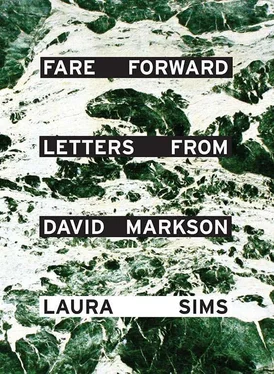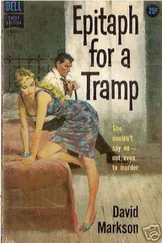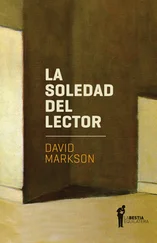123 This essay appeared in The New England Review , Volume 29, Number 3, 2008.
Fénéon, Félix. Novels in Three Lines. New York: New York Review of Books, 2007.
Markson, David. Wittgenstein’s Mistress. Normal, Illinois: Dalkey Archive Press, 1988.
Markson, David. Reader’s Block. Normal, Illinois: Dalkey Archive Press, 1996.
Markson, David. This Is Not a Novel. Washington, D.C.: Counterpoint, 2001.
Markson, David. Vanishing Point. Washington, D.C.: Shoemaker & Hoard, 2004.
Markson, David. The Last Novel. Washington, D.C.: Shoemaker & Hoard, 2007.


Interview with David Markson 124 by Laura Sims
To many readers, even to those of us encountering it almost fifteen years after its publication in 1988, David Markson’s groundbreaking novel Wittgenstein’s Mistress seemed, and still seems, to have come from literature’s future: one that allows for a stripped-down reinvention of character, plot, and narrative while maintaining the emotional intensity and magnetism of the best conventional novels. Markson has refined this alluring combination in the four books that follow Wittgenstein’s Mistress, each one becoming more and more minimal, thus more and more radical, in their use of the traditional elements of fiction. This loosely defined tetralogy (of which each volume can be readily read by itself) consists of: Reader’s Block, This Is Not a Novel, Vanishing Point, and, most recently, and the occasion for this interview, The Last Novel.
In this latest book, one can detect Markson’s singular voice as well as another defining feature of Markson’s work: The Last Novel speaks to its predecessors through a plethora of literary/artistic/athletic/operatic/you-name-it allusions, and through self-reflexive comments on structure, such as: “Nonlinear. Discontinuous. Collage-like. An assemblage.” This interconnectedness is most noticeable in the last four books, but one can trace the tendency in all of Markson’s books, from the recently re-released early “entertainments,” Epitaph for a Tramp and Epitaph for a Dead Beat, to the more seriously literary Springer’s Progress and Going Down.
Although the mainstream literary world has been far too slow in fully appreciating Markson’s work, this May, the American Academy of Arts & Letters honored Markson with an Award for Excellence in Literature. Perhaps it’s a sign that the world is catching up, becoming prepared for Markson’s inventive fiction; we can hope that his readership will markedly increase as he gains more much-deserved attention. In any case, whether the world-at-large is ready or not, Markson will continue to court innovation in the book(s) that will follow The Last Novel. As he explains in the interview, he is determined to reinvent his narrative modus operandi yet again; The Last Novel may mark the end of what has become one of contemporary literature’s most exciting and accomplished series of novels, but it marks a new beginning in Markson’s endlessly pioneering career.
— Laura Sims
Laura Sims:In Vanishing Point, your protagonist speaks about “shuffling and rearranging” his index cards, by way of explaining his method of composition. What does this say about how you yourself go about it, at least in regard to your more recent books? I mean of course those that are crammed with intellectual bits and pieces?
David Markson:It says a great deal, actually. Though in fact my books have always been filled with that sort of material, even if I had to handle it differently, earlier on. Springer, in Springer’s Progress, Kate, in Wittgenstein’s Mistress —they’re both walking repositories of intellectual trivia. But in those instances, the stuff simply fell as it occurred to them, meaning where it was called for in the narrative. But in these last four volumes — where that material is the books — the approach had to be new. All my life I’ve been an inveterate checker-off-in-margins, but in recent years, writing Reader’s Block and the rest, I simply began to copy out the stuff that interested me instead. And where better than on three-by-five cards?
LS:But doesn’t that become unwieldy? After all, there must be thousands for each book, finally.
DM:Do I describe this or don’t I, I can’t remember? I file them one behind the other, in the tops of shoe boxes, ultimately two of those taped end to end. So it comes to about two feet per book, I’d guess. But even as the stacks are expanding, I’m shuffling and rearranging repeatedly, as you quoted a minute ago.
LS:Be more specific.
DM:Oh, well — an item about Dante, let’s say. If that one seems to go relatively near the front here, then where does this other Dante go? Oh, but now wait, this Guido Cavalcanti on the same theme, which of the two do I connect that one with? And before or after? And how nearby, so the connection might be spotted? Et cetera, et cetera. Obviously, because of the numbers alone, it’s far more complicated than that. And on top of which, this is going on for a couple of years also, starting with the lonely very first few cards, and then with each additional one being dropped into one tentative spot or another as I keep on adding.
LS:But even at the end, surely a lot of it still has to be somewhat random?
DM:Of course. There are hundreds of things that I find intrinsically interesting, or that echo different themes, but which have to simply fall where they may. Nonetheless, as I said, those other placements are all generally much more intricate and interconnected than I’ve indicated, and often pretty subtle. I’m also aware that a fairly high percentage of my readers are conscious of very little of it all.
LS:But good readers are?
DM:Naturally, sure. In fact, an amusing story. Even before he finished the first of them, Kurt Vonnegut called me. “David, what sort of computer did you use to juggle all that stuff?” I had to tell him I didn’t own one — I still don’t, incidentally — and that it all came out of my aging and rapidly deteriorating brain. Plus of course those ubiquitous index cards.
LS:Why are you suddenly laughing?
DM:More to the same story, actually. That first of the series, Reader’s Block, is the one in which I mention all those suicides, everybody from Empedocles to Sappho to Hart Crane to Sylvia Plath, there must be a hundred and fifty of them scattered through. Well, and of course also my central figure, Reader himself, at the conclusion. So in any case Kurt called me back a little later, when he’d actually finished. This time it was, “David, I worry about your mental condition.”
LS:Presumably you reassured him?
DM:I’m still extant.
LS:But sadly as of recently he isn’t, alas. Meanwhile—
DM:Wait. Listen. Under the circumstances, would another Vonnegut recollection or two be out of place here?
LS:Of course not. Do, yes.
Читать дальше














